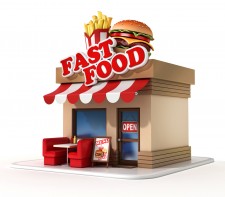The next time you make your way to a chain restaurant for a quick fix, don't think about calling it fast food; the phrase is dying. Don't worry, fast food itself isn't going anywhere, but the term is being re-branded, because it has become so unpopular.
Enter "fast casual" and "fast crafted." And throw in some "artisanal" too. Sounds a bit more appealing, doesn't it?
After all, the new branding is no accident, it's clever marketing. It's meant to attract the customer who wants a quick meal, without the guilt about the ingredients or the guilty feeling of indulging in fast food, or as many now refer to it as "junk food." So it's OK to have the double cheeseburger with a side of fries at your nearest fine-and-fast-but-casual dining establishment, because as long as you don't utter the words "fast food," the calories technically don't count. Because, yes, marketing.
If only things were named right to begin with, we wouldn't be scrambling to rebrand the products we once enjoyed, for fear of being judged. For fun, let's look at some (unintentional) marketing blunders from the past and present:
- Zica, the car: We can only assume that last month Indian car manufacturer Tata was excited to unveil their newest hatchback, Zica. According to officials, the name is a contraction from "Zippy Car," but little did they know, the car would share its name with Zika the mosquito virus, which is now considered a global health emergency. In statements, the company said when the car was first branded, the virus was not well known, but because they understand the hardships that have stemmed from the virus outbreak they will re-brand the car before its launch later this year.
- Electronic cigarettes (e-cigs): E-cigs hit the market a few years ago as tobacco harm reduction products with the intent to deliver the nicotine smokers crave, without the toxic smoke inhaled from smoking cigarettes. The products are considered safer than the real thing, despite efforts to make them tightly regulated. In terms of marketing, however, the vaping devices were behind the eight ball from the get-go: sharing their name with "cigarettes" hasn't quite earned them a badge of health. Other names for the nicotine-delivery devices have surfaced, like "mods" (short for modified cigarettes), but it hasn't been enough to convince consumers that e-cigs are not real cigarettes.
- AYDS Weight-Loss Candy: Talk about a blunder. Ayds was an appetite-suppressant candy in the 70s, and a popular one at that. That is, until along came AIDS. Retailers insisted that "the disease is not hurting the product," but with a name so unfortunate, of course the sales plummeted. Surely, the marketing team had good intentions, playing off the term "aide" for weight loss, but in the end, the candy did not recover.
- ISIS Chocolates: Yikes. This Belgian company has since changed its name to "Libeert" to avoid confusion with the Islamic State group. Don't blame them. Though we're sure the chocolates are yummy, we'd be a little wary opening that box of chocolates.
- Chemical: This one's our fave. Even though it's not a brand per se, the word "chemical" has taken quite a hit since the organic industry mommy bloggers took over the internet. Chemical, by definition, is of, or relating to, chemistry, or the interactions of substances studied in chemistry. Like, the chemistry that makes up the atmosphere. Or the chemical compounds that make up water. Yes, everything around us is made up of chemicals, whether natural or synthetic. And yet, the misconception is widespread that there exists food or products that do not contain chemicals when in fact, the entire universe is made up of chemicals. What once was a word that exemplified science is now a term that makes the environmentalists twitch.
So the downward spiral of the term "fast food" should come as no surprise. But the thing is, fast food is fast. It lives up to its reputation for speed, although that may not be so cool anymore. Even McDonald's didn't think so, since they recently opened the doors to the first McDonald's Next in Hong Kong. The initiative is part of the company's attempt to be "modern and progressive" with salad bars, quinoa, and artisanal (Aha!) cheeses lining the counters. Maybe it truly is an end of an era for the decades-old, tried and tested methods.




